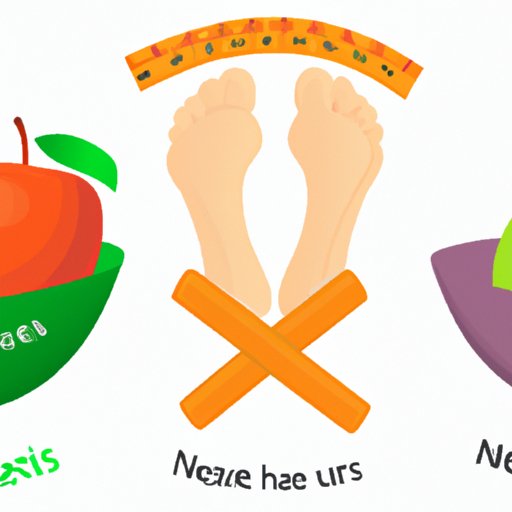
Introduction
This article is geared towards individuals who want to lose weight in a healthy, sustainable way. If you are tired of relying on fad diets and quick fixes that never seem to work, then this article is for you. The purpose of this article is to provide science-backed information that can help you achieve your weight loss goals. Losing weight is not just about looking good, but it also has numerous health benefits, such as reducing the risk of chronic diseases and improving overall well-being.
The Science of Losing Weight: Understanding the Basics
Before embarking on a weight loss journey, it is essential to understand the basics. The human body burns fat through a process called lipolysis. Lipolysis occurs when the body breaks down stored fat to use as energy. The rate at which the body burns fat is dependent on the metabolism.
Metabolism refers to the chemical reactions that occur in the body to maintain life. The metabolism is responsible for converting food into energy, which is used to carry out basic physiological functions such as breathing, circulation, and digestion. The metabolism rate is influenced by several factors such as age, gender, genetics, and body composition.
Calories play a crucial role in weight loss. A calorie is a unit of energy, and our body needs energy to function. The type of calorie consumed can impact weight loss. For instance, foods high in protein and fiber tend to be more filling and can help reduce overall calorie intake.
7 Effective Weight Loss Strategies Proven by Science
Portion control
Portion control involves eating smaller portions of food to manage calorie intake. Studies show that reducing portion sizes can lead to weight loss without having to restrict entire food groups. Tip: Use smaller plates and bowls to help control portion size.
Mindful Eating
Mindful eating involves paying attention to the sensory aspects of food, such as taste, texture, and smell. It also involves being aware of hunger and fullness cues. Studies show that mindful eating can help reduce calorie intake and promote weight loss.
Intermittent Fasting
Intermittent fasting involves periods of time (usually 16-24 hours) of not eating followed by small windows of eating. Several studies have shown that intermittent fasting can lead to weight loss, reduced inflammation, and improve overall metabolic health.
Incorporating Whole Foods in your diet
Foods that are minimally processed and contain whole ingredients such as fruits, vegetables, and whole grains can help promote weight loss. Whole foods tend to be more filling and contain fewer calories per serving.
Cutting down on Sugary Drinks
Sugary drinks, such as soda and juice, can lead to an increase in overall calorie intake. Studies show that reducing sugar-sweetened beverage consumption can lead to weight loss.
Reducing Stress Levels
Stress can lead to overeating and unhealthy food choices. Stress management techniques such as mediation, deep breathing, and yoga can help reduce overall stress levels and promote weight loss.
Getting Enough Sleep
Lack of sleep can disrupt hormones that regulate hunger and appetite, leading to overeating. Studies show that getting enough sleep (7-8 hours per night) can help promote weight loss.
Foods to Eat and Foods to Avoid on Your Weight Loss Journey
High Protein Foods
Protein is an essential nutrient that can help reduce hunger and promote feelings of fullness. Foods high in protein include lean meats, fish, beans, and legumes.
Whole Grains
Whole grains such as brown rice, whole wheat bread, and oats are rich in fiber, which can help promote feelings of fullness and reduce overall calorie intake.
Healthy Fats
Healthy fats such as avocado, nuts, and olive oil can help reduce hunger and promote feelings of fullness. They are also essential for overall health.
Low-Carb Vegetables
Low-carb vegetables such as broccoli, kale, and spinach are rich in fiber and minerals, making them ideal for weight loss.
Recommended Fruits
Fruits such as berries, citrus fruits, and apples are high in fiber and low in calories, making them ideal for weight loss.
Foods to Avoid
Foods high in sugar, refined carbohydrates, and processed foods should be avoided on a weight loss journey. They tend to be high in calories and low in nutrients.

Staying Motivated: Tips for Setting Goals and Tracking Progress
Setting Realistic Goals
Setting realistic goals that are measurable and achievable is essential for staying motivated. Tip: Write down your goals and track your progress.
Journaling Progress
Journaling progress can help provide motivation and accountability. Tip: Write down your food intake and exercise progress.
Celebrating Small Milestones
Celebrating small milestones can help keep motivation high. Tip: Treat yourself to a non-food-related reward when you meet a milestone.
Rewarding Yourself
Rewarding yourself for sticking to your weight loss journey can help provide motivation. Tip: Treat yourself to a favorite food item (in moderation).
The Role of Exercise in Weight Loss and Building a Healthier You
Types of Exercises
Cardiovascular exercises such as running, biking, and swimming are effective for weight loss. Resistance training such as weightlifting can help increase muscle mass and metabolic rate.
How to Incorporate Exercise into your Daily Routine
Aim to include at least 30 minutes of physical activity daily. Tip: Take the stairs instead of the elevator, go for a walk after dinner, or join a fitness class.
Benefits of Exercise beyond just Weight Loss
Exercise has numerous health benefits beyond just weight loss. It can improve overall fitness, reduce the risk of chronic diseases, and improve mental health.
Common Weight Loss Myths Debunked: What You Should Know Before Starting Your Journey
Myth #1: Eating less will automatically lead to losing weight
Eating too few calories can lead to a slow metabolism and loss of muscle mass. It is important to eat enough calories to support metabolic function and exercise.
Myth #2: Fad diets are effective
Fad diets tend to be restrictive and unsustainable, leading to eventual weight regain. It is essential to adopt a sustainable lifestyle change for long-term weight loss.
Myth #3: You have to cut out all carbs to lose weight
While reducing overall carbohydrate intake can lead to weight loss, cutting out all carbs is not necessary. It is important to consume complex carbohydrates, such as whole grains and fruits, to support metabolic function.
Myth #4: Skipping meals is a good idea
Skipping meals can lead to overeating and disrupt metabolic function. It is important to eat balanced meals throughout the day to promote overall health and weight loss.
Myth #5: Supplements can replace a healthy diet
Supplements should not replace a healthy diet. A balanced diet that includes whole foods is necessary to support overall health and weight loss.
Conclusion
Losing weight can be challenging, but it is not impossible. It requires a sustainable lifestyle change that includes healthy eating habits, regular exercise, and stress management. The key is to set realistic goals, track progress, and stay motivated. Remember that weight loss is not just about looking good, but it also has numerous health benefits. Take action today, and you will achieve your weight loss goals in no time.




